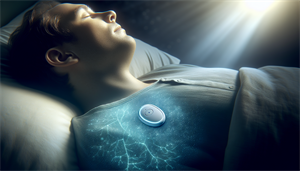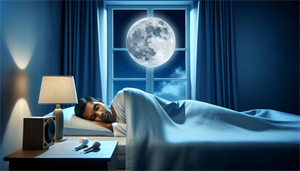Wondering if your anxiety is the culprit behind your sleep apnea? You’re not alone. Many people find themselves in a vicious cycle where anxiety and sleep disturbances seem to fuel each other. But can anxiety cause sleep apnea? In this article, we’ll explore the connection, basing our findings on the latest research and expert opinions. We’ll also provide actionable steps to manage both conditions, so you can rest easier and tame the anxiety that may be affecting your sleep.
Key Takeaways
-
Sleep apnea and anxiety have a bidirectional relationship where each condition can exacerbate the symptoms of the other, leading to increased stress and poor sleep quality.
-
Various forms of sleep apnea, such as obstructive sleep apnea and central sleep apnea, show a unique correlation to anxiety, with severe cases often experiencing more intense anxiety symptoms.
-
Treatment for sleep apnea and anxiety includes CPAP therapy, cognitive behavioral therapy, medications, and natural approaches, with the effectiveness of treatment varying among individuals.
Understanding the Relationship Between Anxiety and Sleep Apnea
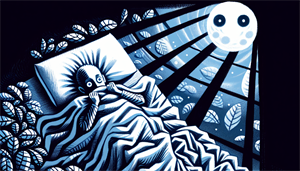
The entangled relationship between anxiety and sleep apnea is like a sinister dance, where each step feeds the other, leading to an exhausting and stressful daily routine. A mutual relationship exists between anxiety and sleep apnea. Sleep apnea, a disorder characterized by interrupted breathing during sleep, can lead to poor sleep quality, resulting in increased stress and fatigue during the day. This heightened daytime stress can, in turn, give rise to anxiety disorders. Adding to this, the choking sensations experienced by people with sleep apnea at night are more prevalent in patients with anxiety, indicating a direct correlation between sleep apnea symptoms and an increased incidence of anxiety.
The complexity of this connection deepens when factoring in the severity of sleep apnea. Individuals with obstructive sleep apnea syndrome (OSAS) who also have anxiety symptoms may encounter more frequent choking and distressing symptoms during sleep. This suggests that the severity of sleep apnea may be directly proportional to the intensity of anxiety. However, there’s a silver lining. Effective treatment of sleep apnea can lead to an improvement in sleep anxiety, reducing sleep deprivation.
The Impact of Anxiety on Sleep
Anxiety harbors its own set of detrimental effects that can disrupt sleep. It can lead to insomnia, increasing the likelihood of sleep-related disorders like sleep apnea and sleep disorders. The psychological status of individuals with obstructive sleep apnea syndrome is often evaluated using tools like the Beck Depression Inventory and the Beck Anxiety Inventory. These tools help monitor the impact of anxiety on sleep and manage the symptoms effectively.
Anxiety, much like a nocturnal thief, robs precious hours of rest, leaving behind fatigue and worry. This not only disrupts your sleep but can also amplify the symptoms of sleep apnea, creating a vicious cycle that can be difficult to break.
How Sleep Apnea Affects Anxiety Levels
Shifting perspectives, we’ll now examine how sleep apnea influences anxiety levels. Sleep apnea, especially obstructive sleep apnea, can lead to increased stress and fatigue during the day due to poor sleep quality at night. This can result in heightened anxiety levels, creating a detrimental cycle where sleep apnea and anxiety mutually exacerbate each other.
Breaking this detrimental cycle is key for improved health outcomes. Therefore, it’s recommended to seek treatment for both sleep apnea and anxiety. Addressing one condition can often lead to improvements in the other, enhancing overall quality of life.
Types of Sleep Apnea and Their Connection with Anxiety
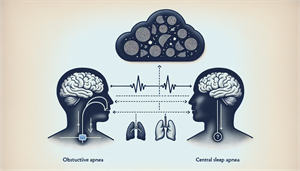
Just as dance has various forms, sleep apnea comes in different types, each with its unique correlation to anxiety. Obstructive sleep apnea (OSA) and central sleep apnea are two such types. OSA, characterized by breathing difficulties during sleep, can be exacerbated by sleep-related anxiety. A study in 2014 suggested that individuals with OSA were more prone to experiencing anxiety symptoms, and severe OSA was associated with a higher probability of these symptoms.
On the other hand, central sleep apnea, which results in significant fatigue, daytime drowsiness, and irritability, can disrupt sleep patterns and harm mental well-being, potentially contributing to anxiety. Furthermore, an intriguing connection exists between sleep apnea and an increased likelihood of developing panic disorder, a specific manifestation of anxiety.
Obstructive Sleep Apnea
Obstructive sleep apnoea, also known as obstructive sleep apnea, is a significant medical condition characterized by the interruption of breathing during sleep. This can sometimes last for more than 10 seconds, leading to disrupted sleep and increased fatigue during the day.
Symptoms of obstructive sleep apnea encompass a wide range of issues, including:
-
Loud snoring
-
Excessive daytime sleepiness
-
Waking up feeling tired
-
Headaches upon waking
It’s like an unwanted alarm clock that disrupts your sleep without any snooze button.
Diagnosing this condition involves tests like polysomnography, which monitors heart, lung, and brain activity, breathing patterns, and blood oxygen levels while the individual is asleep.
Central Sleep Apnea
Unlike obstructive sleep apnea, central sleep apnea arises from the brain’s inability to prompt the muscles to breathe. This failure leads to temporary periods where the individual does not make an effort to breathe, disrupting sleep and leading to symptoms such as:
-
severe fatigue
-
daytime drowsiness
-
irritability
-
frequent awakenings during the night
These symptoms can significantly impact mental health, potentially contributing to anxiety, bipolar disorder, and psychiatric disorders.
Diagnosing central sleep apnea involves the use of a polysomnogram, a type of sleep study that monitors various body functions during sleep, including:
-
Breathing patterns
-
Blood oxygen levels
-
Heart rate
-
Muscle activity
This test helps identify the condition and provides a roadmap for appropriate treatment.
Recognizing the Signs of Sleep Apnea and Anxiety
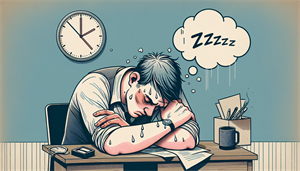
Recognizing the symptoms of sleep apnea and anxiety is similar to detecting an impending storm. It helps you prepare and seek appropriate shelter—in this case, medical help. So, what are these signs?
Anxiety symptoms often include:
-
Feelings of nervousness, restlessness, or tension
-
A sense of impending danger, panic, or panic attacks
-
Difficulty concentrating
-
Physical manifestations such as rapid heartbeat or unexplained aches and pains.
Sleep apnea, on the other hand, is characterized by symptoms such as:
-
severe fatigue
-
daytime drowsiness
-
irritability
-
loud snoring
The distinguishing factors between these two conditions are vital in identifying and addressing them appropriately for better well-being.
Sleep Apnea Symptoms
If sleep apnea were an uninvited guest at a party, how would you recognize it? It makes its presence known through snoring, choking or gasping during sleep, and excessive daytime sleepiness.
But why does sleep apnea make you feel sleepy during the day? This is due to the interruptions in your sleep caused by the collapse of the upper airway during sleep. However, with the right treatment, this can be managed and your energy levels can be restored.
Anxiety Disorder Symptoms
Anxiety disorders, on the other hand, make their presence known through a different set of signs. These disorders might cause individuals to experience physical symptoms such as increased heart rate and excessive worry and tension.
Anxiety doesn’t just affect the body—it also affects the mind. Cognitive symptoms linked to anxiety disorders include:
-
Selective attention and working memory impairment
-
Decreased cognitive ability
-
Increased distractibility
-
Attentional lapses
-
Slower information processing speed
It’s like trying to navigate a maze in the dark. Recognizing these symptoms can be the first step in getting the help needed to turn on the lights.
Treatment Options for Sleep Apnea and Anxiety

As multiple paths can lead to a destination, there are various treatment options for sleep apnea and anxiety. These include medical interventions, therapy, and lifestyle changes. Knowledge of these treatments can be a powerful tool in managing both conditions and improving overall health.
For anxiety disorders, there are several treatment options available, including:
-
Cognitive behavioral therapy (CBT), which helps individuals identify and change unproductive thoughts and behaviors that contribute to anxiety
-
Medications prescribed by a healthcare professional
-
Natural approaches such as relaxation techniques, exercise, and herbal supplements
It’s important to consult with a healthcare professional to determine the best treatment plan for your specific needs.
Treating Sleep Apnea
For sleep apnea, the main approach to treatment typically involves continuous positive airway pressure (CPAP) therapy. This therapy uses a machine to deliver compressed air into the lungs through a mask or nose tubes while the patient sleeps, keeping the airways open.
However, not every treatment suits everyone. If PAP therapy is not suitable or preferred, alternative treatments are available. These include:
-
Different types of PAP machines
-
Oral appliances
-
Lifestyle modifications
-
Surgery
-
Positional therapy
Each treatment option has varying degrees of success.
Managing Anxiety Disorders
Anxiety disorders can be managed effectively through various treatments. Cognitive behavioral therapy (CBT) has shown high effectiveness in the treatment of these disorders, with studies showing moderate to large effects in alleviating symptoms.
In addition to CBT, certain medications are typically recommended for managing anxiety disorders. These include SSRIs like citalopram, escitalopram, and fluoxetine, as well as certain antidepressants and benzodiazepines. Natural approaches, such as lifestyle strategies and dietary changes, can also be beneficial.
Strategies for Improving Sleep Quality and Reducing Anxiety
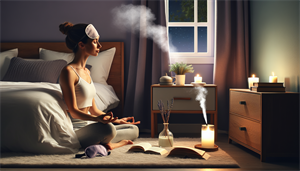
Apart from sleep medicine, individuals can adopt daily strategies to enhance sleep quality and mitigate anxiety. These include sleep hygiene practices and stress-reduction techniques.
Adhering to a consistent sleep schedule is particularly beneficial, as it helps regulate the body’s internal clock, leading to improved sleep quality, and can also enhance focus and cognitive abilities. Meanwhile, various stress-reduction techniques, from deep breathing exercises to physical activity, can help manage anxiety.
Sleep Hygiene Practices
Good sleep hygiene practices are like a bedtime ritual that sets the stage for a good night’s sleep. This involves:
-
Optimizing your sleep schedule
-
Investing in a better mattress and bedding
-
Blocking out light
-
Minimizing noise
-
Setting the thermostat to a comfortable temperature, typically between 65 to 68 degrees Fahrenheit.
Maintaining a consistent sleep schedule is also crucial. It helps regulate the body’s internal clock, leading to improved sleep quality, and can aid in managing conditions like sleep apnea and anxiety. Moreover, scientific evidence indicates that by integrating appropriate sleep hygiene practices, individuals can foster improved sleep quality.
Stress-Reduction Techniques
Stress-reduction techniques include:
-
Breath focus
-
Body scan
-
Guided imagery
-
Mindfulness meditation
-
Yoga
-
Tai chi
-
Progressive muscle relaxation
All of these techniques have been found to be effective in managing anxiety.
Mindfulness meditation, in particular, has been shown to significantly reduce anxiety and enhance sleep quality. By focusing on the present moment without judgment, it can create a relaxed state that promotes better sleep.
Physical activities, such as aerobics or yoga, can also effectively reduce stress and improve sleep quality.
When to Consult a Healthcare Professional
Seeking a healthcare professional’s advice is akin to requesting reinforcements when grappling with sleep apnea and anxiety. If you suspect that an undiagnosed sleep disorder or anxiety disorder is impacting your well-being, it’s crucial to seek professional help. Early intervention and appropriate treatment can prevent the psychological distress, including depression, anxiety, and suicidal thoughts, that can result from these conditions.
Moreover, it can also prevent the disruption of sleep patterns and impairment of daytime focus.
Summary
In conclusion, the relationship between sleep apnea and anxiety is complex, each condition potentially exacerbating the other. Recognizing the signs of these conditions and seeking appropriate treatment is crucial for managing them effectively. Treatment options vary from medical interventions and therapy to lifestyle changes, sleep hygiene practices, and stress-reduction techniques. If you’re battling with sleep apnea and anxiety, remember, you’re not alone. Reach out to healthcare professionals and arm yourself with knowledge. After all, knowledge is power, and it’s the power to improve your sleep and reduce your anxiety.
Frequently Asked Questions
How long will it take to reverse damage from sleep apnea?
Treating sleep apnea with CPAP for just 12 months can almost entirely reverse the damage done to white matter, improving sleep and reducing the risk for cognitive issues.
What are 3 symptoms of sleep apnea?
The symptoms of sleep apnea include loud snoring, episodes of breathing cessation during sleep (reported by another person), and gasping for air during sleep. These symptoms can also lead to awakening with a dry mouth, morning headaches, insomnia, and excessive daytime sleepiness.
Can you reverse sleep apnea?
No, sleep apnea cannot be reversed, but treatments and lifestyle changes can effectively reduce symptoms and improve the condition. It's important to consult with a healthcare professional to explore the available options for managing sleep apnea.
What is the relationship between sleep apnea and anxiety?
The relationship between sleep apnea and anxiety is complex, with each condition potentially exacerbating the other. Sleep apnea can disrupt sleep, leading to increased stress and fatigue during the day, which can give rise to anxiety disorders. Similarly, anxiety can disrupt sleep, increasing the likelihood of sleep-related disorders like sleep apnea.
What is the main approach to treating sleep apnea?
The main approach to treating sleep apnea is typically positive airway pressure (PAP) therapy, which uses a machine to deliver compressed air into the lungs through a mask or nose tubes while the patient sleeps, keeping the airways open. This helps to alleviate the symptoms and improve sleep quality.
